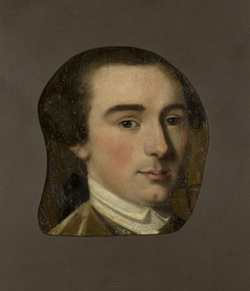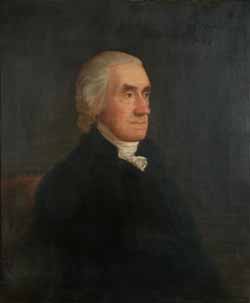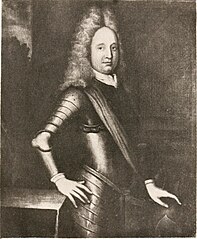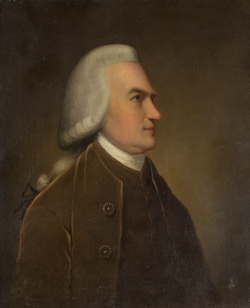The dispute that led to colonial Massachusetts’s second impeachment action started with the
Townshend Acts of 1767.
Parliament imposed new tariffs on a handful of goods, particularly
tea. And it said the revenue from those taxes would go to administering the colonies.
The expenses of that royal administration included salaries for the governors in most colonies and for the judges those governors appointed.
In the fallow period of 1771 to early 1773, with no new taxes and no
troops on the streets of Boston,
Samuel Adams didn’t have many issues to raise, so he highlighted those judicial salaries.
Through Boston’s committee of correspondence, Adams argued that not only had
Parliament imposed taxation without representation, but those salaries would insulate judges from local pressure. The colonial legislatures would no longer be able to limit or delay judges’ pay to signal displeasure with their rulings.
On 14 Dec 1772,
Cambridge called a
town meeting to consider that problem. Most men at that meeting endorsed the Boston committee’s position. But one local big man objected.
William Brattle (shown here) was an old-fashioned type of country gentleman—a little bit of a
lawyer, a little bit of a
doctor, a little bit of a merchant, a little bit of a farmer. In politics he had become a member of the
Council, and in the
militia he had risen to the rank of general.
Back in 1765, Brattle had marched at the head of the anti-
Stamp Act processions beside
Ebenezer Mackintosh. Gov.
Francis Bernard saw him as one of his most nettlesome enemies. But Gov.
Thomas Hutchinson had apparently won Brattle over to the Crown side, possibly with those militia promotions.
Brattle told his fellow Cambridge citizens that judicial salaries weren’t anything to worry about. He claimed that judges were appointed for life as long as they maintained “good behavior.” Once judges were on the bench, therefore, neither the royal government nor the populace had leverage over them. (He also said that since official word about judicial salaries hadn’t come from London yet, the town shouldn’t vote on the matter.)
After losing that vote, Brattle published his argument in the 31 December
Boston News-Letter.
In the 4 Jan 1773
Boston Gazette someone signing “M.Y.” addressed “W.B. Esq.,” asking how he could hold such a position when as a member of the Council he had heard that Gov. Bernard had written to Gov. Hutchinson that judicial salaries were definitely a go. Brattle denied having heard any such letter.
The
11 Jan 1773 Boston Gazette brought a more vigorous response to Brattle from
John Adams. Citing various legal authorities, he wrote that judges were appointed “at the pleasure” of the Crown, forcing those men to maintain the approval of the royal government to keep their jobs.
The next week, Adams published another essay saying the same thing, with different sources. And then the week after that. In all, Adams published seven essays to Brattle’s two. By March, even Adams wrote in his diary: “I have written a tedious Examination of Brattle’s absurdities.”
In his diary Adams also claimed that in the town meeting Brattle had said “Mr. [
James] Otis, Mr. Adams, Mr. John Adams I mean, and Mr.
Josiah Quincy” wouldn’t be able to refute his argument, and that he had later issued a public challenge in the newspapers. I can’t find Brattle doing the latter. But Adams was clearly rankled. He also told his diary in March:
My own Determination had been to decline all Invitations to public Affairs and Enquiries, but Brattles rude, indecent, and unmeaning Challenge of me in Particular, laid me under peculiar Obligations to undeceive the People, and changed my Resolution. I hope that some good will come out of it.—God knows.
Remember the
xkcd cartoon, “Someone is wrong on the internet”? That was basically Adams’s reaction.
Those newspaper essays didn’t have much effect. The exchange probably raised Adams’s profile a little and pushed Brattle further into the royal governor’s camp. But the London government had a plan, and all the resolutions passed by all the town meetings in Massachusetts wouldn’t change that.
In February, as John Adams’s essays rolled on, Gov. Hutchinson confirmed that
Lord North had ordered the judges paid from the tariffs. The
Massachusetts assembly, with Samuel Adams as its clerk and guiding voice, responded:
We conceive that no Judge who had a due regard to Justice, or even to his own Character, would chuse to be placed under such an undue bias as they must be under, in the Opinion of the House, by accepting of and becoming dependent for their Salaries upon their Crown. Had not his Majesty been misinformed with Respect to the Constitution and Appointment of our Judges by those who advised to this Measure, we are persuaded he would never have passed such an Order.
That dig about “misinformed” was how Samuel Adams and his allies were representing the larger situation: Bernard, Hutchinson, and other royal appointees were feeding the government in London false information, and the result were these unjust measures that Massachusetts didn’t deserve.
TOMORROW: Rival salaries.


















